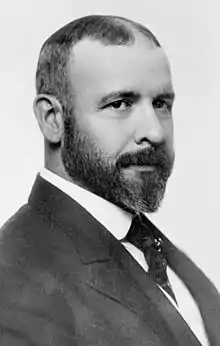
The Purdue State Bank Building is a historic structure in West Lafayette, Indiana, United States, designed by American architect and Frank Lloyd Wright's mentor Louis Sullivan. Completed in 1914, the bank is the smallest and least expensive of Sullivan's "Jewel Boxes", a series of Midwestern banks designed in the modern style at the end of his career. Built on a tiny, trapezoidal lot between two streets, the structure is less ornamental than most of the architect's other work, including only a few terra cotta panels.[1][2] The building cost $14,600 to be constructed, of which only about 10% was paid to Sullivan, barely covering his expenses. A local paper at the time referred to Sullivan as "one of the most noted bank architects in the United States".[3]
During the 1950s, a stone portion was added to the back of the building and the original doorway was converted into a window and then an ATM.[4] The building is located one block from Purdue University and currently houses a branch of Chase bank.[5]
 detail of door surround
detail of door surround detail of ornament
detail of ornament
References
- ↑ Kvaran, Einar Einarsson, The Louis Sullivan Pilgrimage, unpublished manuscript
- ↑ Elia, Mario Manieri, Louis Henry Sullivan, Princeton Architectural Press, NY 1996, p.159
- ↑ Twombly, Robert, Louis Sullivan: His Life and Work, Elizabeth Sifton Books, Viking, NY 1986, p. 420-421
- ↑ Booth, Eileen E. "Downtown Lafayette-West Lafayette Architectural Terra Cotta" (PDF). Visit Lafayette — West Lafayette. p. 14. Archived from the original (PDF) on May 24, 2014. Retrieved May 23, 2014.
- ↑ Google Maps for 210 West State Street in West Lafayette, Indiana, United States, retrieved May 23, 2013.
External links
 Media related to Purdue State Bank at Wikimedia Commons
Media related to Purdue State Bank at Wikimedia Commons
40°25′26″N 86°54′28″W / 40.4238°N 86.9077°W
